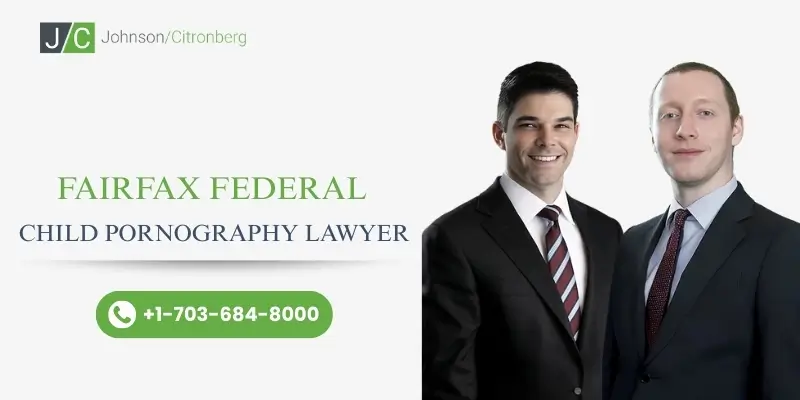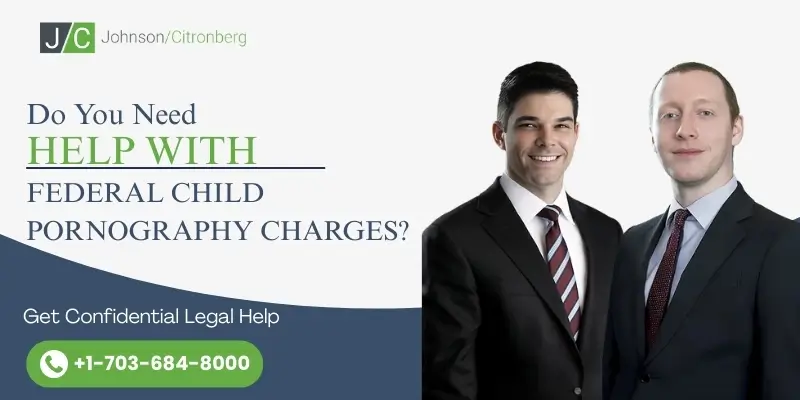Fairfax Federal Child Pornography Lawyer
Federal Child Pornography Attorney in Fairfax, VA
Being charged with a federal child pornography offense in Fairfax is one of the most severe and frightening experiences a person can face. The charges can carry a stigma that ruins lives even before the court case begins, tearing families apart and ending careers. If you have been accused of federal child pornography, you need a skilled Fairfax federal child pornography lawyer right away to begin fighting for your future.

About Johnson/Citronberg
Johnson/Citronberg is a nationally acclaimed litigation firm based in Alexandria, Virginia, and Atlanta, Georgia. Our attorneys have made appearances in the Eastern District of Virginia on numerous occasions and are familiar with the pressures of its rapid docket.
Virginia Super Lawyers, Northern Virginia Magazine, and the Washington Post have named Johnson/Citronberg to their lists of those who have achieved the highest standards of excellence in criminal defense. Our attorneys have decades of combined experience defending those accused of serious federal crimes, including child pornography charges. We are discreet, aggressive, and compassionate.
Understanding Federal Child Pornography Laws
Most federal child pornography cases in Fairfax are handled by the United States District Court for the Eastern District of Virginia (Alexandria Division). The courthouse has earned the nickname “Rocket Docket” since cases finish here faster than in most federal courts throughout the country. If you’re facing charges, it’s critical to understand the federal court process for child pornography cases so you can act quickly and strategically.
Because of this, it is imperative that anyone who is the subject of an investigation or who has recently been charged get experienced legal representation as soon as possible. A lawyer can help you understand relevant laws, such as:
- 18 U.S.C. § 2251. The sexual exploitation of children involves persuading or enticing minors to participate in sexually explicit actions for creating images or videos.
- 18 U.S.C. § 2252. This covers the receipt, possession, and distribution of child pornography. The defendant could face sentences of 5, 10, 15, or 20 years in prison, depending on the facts of the case, and repeat offenders are subject to enhanced penalties.
- 18 U.S.C. § 2252A. This statute forbids individuals who knowingly access child pornography with the intent to view it and those who transport child pornography between states.
In contrast to state cases, where probation and alternative sentencing may be options in some cases, federal statutes carry stiff mandatory minimums. Competent defense representation is not a luxury, but a necessity.
Sentencing Guidelines and Consequences
The U.S. Sentencing Guidelines set offense levels based on the number of images, use of a computer, and distribution, among other factors. Enhancements rapidly bring guideline ranges into double-digit years. Possession alone can result in 5–10 years in prison. Production sentences are typically 15 or more years. Production sentences are typically 15 or more years. For a deeper understanding of how courts calculate ranges and enhancements, review the federal child pornography sentencing guidelines.
In addition to criminal consequences, an offender may face additional collateral consequences as well, such as:
- Registration as a sex offender, which can dictate where you live
- Internet restrictions
- Employment roadblocks
- Losing your professional license
- Strained relationships
- Losing custody of your children
How Investigations Begin
Of those convicted of child pornography in fiscal year 2023, 47.3% were found guilty of trafficking, 43.9% of possessing, and 8.8% of acquiring child pornography. In many federal investigations that begin in Fairfax, the first step is out of the suspect’s hands. The investigation may start when an internet service provider (ISP) or cloud storage company reports an incident to the FBI or Homeland Security Investigations (HSI). If you’re unsure how a matter might have started, it helps to know how internet crimes are reported in Virginia.
Under federal law, major internet companies must report suspected child sexual exploitation material to the National Center for Missing & Exploited Children (NCMEC). NCMEC, in turn, refers the reports to federal agencies.
Agents have the capability to operate under false identities within peer-to-peer networks and messaging applications, as well as online forums. When a suspect is identified, investigators apply for search warrants at the federal courthouse. Devices are seized and forensic analysts search them for illegal images or videos, or for internet activity that may be incriminating.
Hire a Federal Child Pornography Lawyer
An experienced Fairfax federal child pornography attorney can review the evidence against you, protect your rights, negotiate with prosecutors, and develop a strong defense strategy based on the unique circumstances of your case. Prompt legal assistance can make a significant difference in the outcome of your case and the impact it may have on your life.
FAQs
Is It Illegal for a Minor to Watch Porn in Fairfax, VA?
Minors themselves are rarely subject to criminal prosecution for their own viewing of pornography, but in Virginia, it is a crime to provide them with sexually explicit material. The laws are designed to protect children from exploitation. Possession or distribution of child pornography is a crime that may be punished by federal or state law, regardless of the age of the possessor or distributor.
What Is the Difference Between Viewing and Possessing?
Viewing is the act of accessing explicit content, for example, streaming pornography online, without any form of download or storage. Possession refers to having a copy of the illegal content. Possession of child pornography is a criminal offense in and of itself, even if it is not actively viewed, under federal law. Possession of child pornography is typically punishable more severely than just having access to it.
Is Showing Pornography to Minors Illegal in Fairfax, VA?
Yes, it is illegal to show pornography to minors under both federal and state laws. It is classified as the distribution or exhibition of obscene material to a minor and is punishable by fines and imprisonment. State laws and offense severity dictate the exact federal child pornography penalties, which are typically harsh to safeguard minors against sexual exploitation and its psychological damage.
When Did Child Pornography Become Illegal in Fairfax, VA?
Child pornography laws began to take root in the 1970s with the Protection of Children Against Sexual Exploitation Act of 1977. This was a major federal action. Over time, since then, laws have been added and evolved to include exploitation, distribution, production, and possession. Laws are even being put in place to criminalize AI-generated child pornography, even if no actual children are harmed in its creation.
Contact Johnson/Citronberg Today
Being charged with a federal child pornography crime is a serious matter. Hire a federal child pornography lawyer at Johnson/Citronberg today. We can help you in the upcoming legal process. Contact us today to get started.



